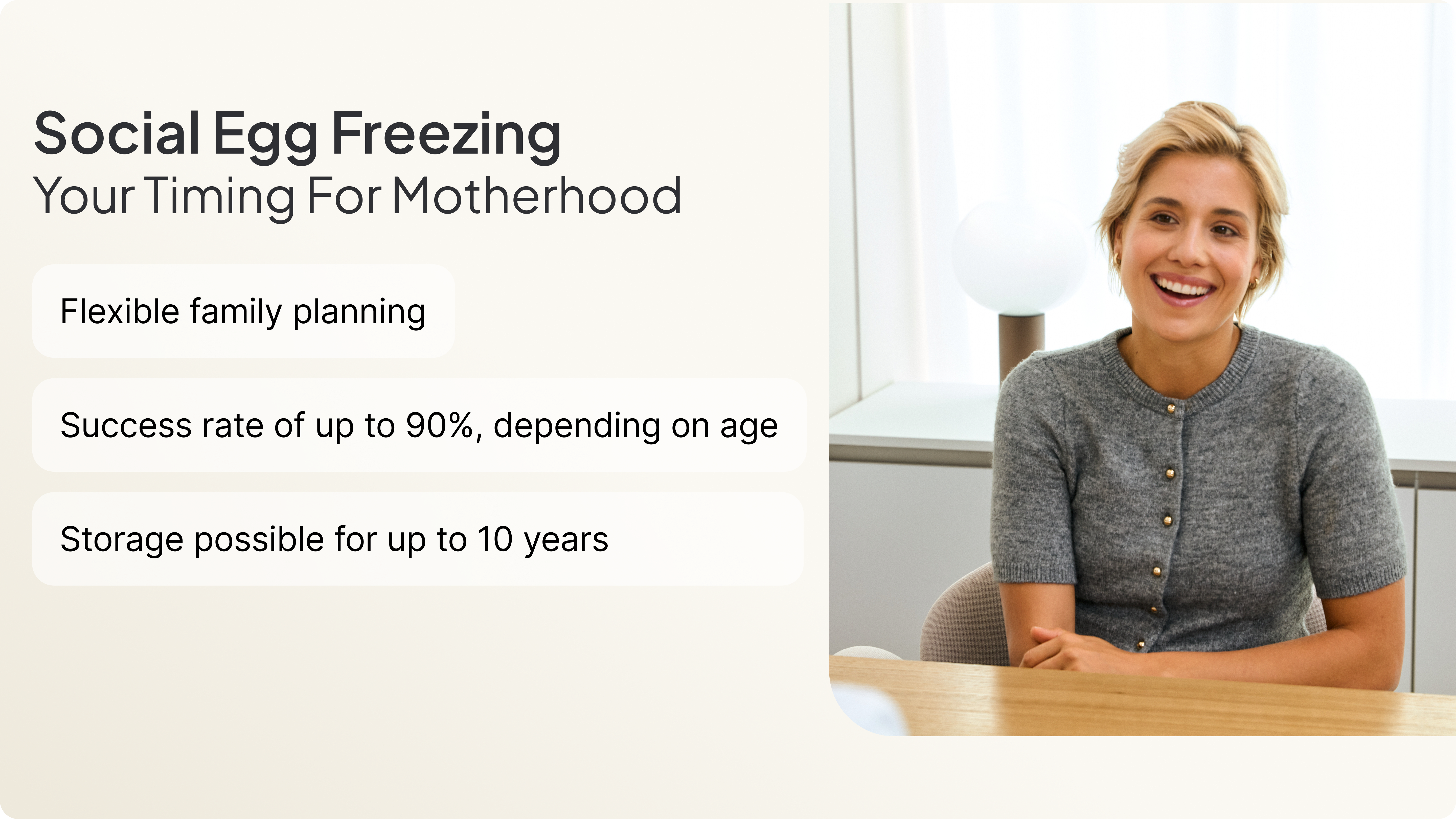Freeze before 38 for up to 70% success. Learn how age impacts social egg freezing—timing, costs & key facts you didn't expect.
Everything You Need to Know About Age and Social Egg Freezing
- The younger you are when you freeze your eggs, the better your chances of success.
- The ideal time for egg freezing is between the ages of 30 and 37.
- Women under 38 have about a 70% chance of a live birth if over 20 eggs are frozen. For women aged 41 and older, the success rate drops to around 33%.
- In many countries, storage is limited to 10 years.
- The cost of social freezing (including medication) ranges from CHF 6,000 to 8,000 per cycle.
Press Pause on the Biological Clock
You’d like to have children one day—but right now, life just doesn’t feel like the right time. Your career is going well, maybe you haven’t found the right partner yet, or starting a family simply isn’t on your radar. Suddenly, a few years fly by—and your biological clock is ticking louder than ever.
Now imagine being able to pause the aging of your eggs and have children when the timing feels right for you. With social egg freezing—also known as fertility preservation for non-medical reasons—you can preserve your eggs while you're still young and choose to start a family at a later date. In a way, you can outsmart your biological clock.
Your fertility. Your choice.

Want to keep your options open—even if having a baby isn’t on the cards just yet? With social egg freezing, you can plan ahead today and decide freely tomorrow. Get free, personalized advice at our fertility clinic in Zurich.
Book your confidential, no-obligation consultation now.
Social Egg Freezing Is on the Rise
Social egg freezing has become increasingly popular in recent years. Between 2019 and 2022, the number of women in Switzerland choosing to freeze their eggs more than doubled. The most common reasons? Career goals, not having a partner, or wanting to pursue other life plans first.
This growing trend is also reflected in the expanded services and improved technologies offered by fertility clinics. Of course, the process isn’t as simple as it might sound. There are many things to consider: What’s the best age to freeze your eggs? What are the chances of success? And how much does it all cost?
In this article, we’ll explore the best age for social freezing, the key factors to keep in mind, and what your chances are of getting pregnant in the future.
What Is Social Freezing?
Social freezing – more precisely, social egg freezing – refers to the proactive preservation of a woman’s eggs for non-medical reasons. The goal is to safeguard fertility until the time feels right to start a family. These frozen eggs can later be used in fertility treatments like IVF.
Common reasons include career plans, not having a partner, or simply wanting to take control of family planning—without being pressured by the ticking biological clock.
What’s the Best Age to Freeze Your Eggs?
The younger a woman is when she freezes her eggs, the less likely she’ll actually need them later—but the better the chances of success if she does.
Determining the best time for egg freezing isn’t always straightforward. However, studies suggest that the early 30s—specifically between ages 30 and 37—may offer the optimal balance between egg quality and likelihood of future use.
Why?
- Women under 30 typically still have strong fertility and often conceive naturally. So the chances of ever needing their frozen eggs are relatively low.
- For women over 40, the chances of a successful pregnancy using frozen eggs drop significantly with age.
That’s why a thorough consultation is essential before making a decision. This should include a discussion about what happens to unused eggs—whether they’re discarded, donated, or used for research.
Also good to know: the maximum storage time is typically 10 years. So if you freeze your eggs at 28, you’ll need to use them by the time you’re 38.
How Successful Is Social Freezing at Different Ages?
The success of social freezing depends heavily on a woman’s age at the time her eggs are retrieved. The younger she is, the better the egg quality tends to be—and the higher the likelihood of a future pregnancy.
According to a meta-analysis, survival rates of eggs after vitrification and thawing range from 90% to 97%, fertilization rates from 71% to 79%, implantation rates from 17% to 41%, and clinical pregnancy rates per transfer from 36% to 61%.
Another study found that women under 38 who froze more than 20 mature eggs had about a 70% chance of a live birth. In contrast, for women aged 41 and older, the chance dropped to 33%, even with the same number of thawed eggs.

Can You Still Freeze Your Eggs at 40?
Yes, it’s technically possible to freeze your eggs at 40. However, by this age, egg reserves are often significantly lower. Women over 40 are strongly advised to seek personalized counseling at a fertility clinic to set realistic expectations.
An AMH test (Anti-Müllerian Hormone) can provide insight into your egg reserve and potential success rates.
Can You Get Pregnant with Frozen Eggs After Menopause?
Yes—if your eggs were frozen before menopause, they can still be used afterward through IVF, and more specifically ICSI (intracytoplasmic sperm injection). However, the hormonal conditions required for pregnancy must be created artificially at that point.
Curious about the best time to freeze your eggs? Fertility specialist Dr. Lora Shahine shares her expert insights.
The Egg Freezing Process
Egg freezing involves several medical steps, all closely supervised by fertility specialists:
1. Initial Consultation and Testing
It all starts with a comprehensive consultation and various tests to assess your ovarian reserve and overall health. This includes hormone tests (like AMH levels), ultrasounds, and possibly additional diagnostics.
2. Hormonal Stimulation
You’ll receive hormone injections to stimulate your ovaries to produce multiple eggs. This treatment usually lasts 10 to 14 days, with regular monitoring via ultrasound and blood tests to adjust dosage as needed.
3. Triggering Ovulation
Once enough eggs have matured, ovulation is triggered with an injection. About 36 hours later, the eggs are ready to be retrieved.
4. Egg Retrieval (Egg Collection)
Mature eggs are collected through a transvaginal follicular aspiration, a minor procedure lasting 15–30 minutes and performed under light sedation. A thin needle is used to gently suction the eggs from the follicles during the egg collection process.
5. Quality Assessment
In the lab, the quality of your eggs is examined. Only the best and fully mature eggs are selected for freezing. At Cada, we use AI-based egg cell scoring to assess key markers of egg quality more precisely and support the embryologists in selecting the most promising eggs for cryopreservation.
6. Oocyte Cryopreservation (Freezing)
All healthy eggs are rapidly frozen using a technique called vitrification, which prevents ice crystal formation that could damage the cells. The eggs are then stored in liquid nitrogen at -196°C.
What Happens Next?
At a later point, the eggs can be thawed through a carefully controlled thawing process and used for in-vitro fertilization (IVF). IVF is a form of assisted reproduction in which eggs and sperm are brought together in the lab to achieve fertilization. In many cases—especially when using frozen eggs—ICSI (Intracytoplasmic Sperm Injection) is used as an advanced form of IVF. With ICSI, a single sperm is directly injected into each egg to increase the chances of successful fertilization. The resulting embryos are then transferred into the uterus.
How Much Does Social Freezing Cost?
Egg freezing costs vary depending on the country and clinic. In Switzerland, you can expect to pay between CHF 6,000 and 8,000 per egg-freezing cycle. Health insurance typically only covers the cost if there are medical conditions (known as medical egg freezing), such as before cancer treatment or in cases of endometriosis.
Takeaway: Social Freezing Increases the Chances of Pregnancy Later in Life
While social egg freezing can't guarantee a future pregnancy, it can significantly increase your chances. If you're postponing parenthood for personal or professional reasons, it’s worth exploring your options early.
At our fertility clinic in Zurich, we offer comprehensive, one-on-one consultations to support your fertility journey.
Frequently Asked Questions About Age & Egg Freezing
How does age affect egg quality?
Women are born with a finite number of eggs. Over time, this reserve decreases—both in quantity and quality. Younger women generally have healthier eggs with a higher likelihood of leading to a successful pregnancy after fertilization.
As a woman ages, the risk of chromosomal abnormalities increases, which in turn raises the chances of miscarriage or genetic conditions in the child.
How long can eggs be frozen?
Technically, eggs can be stored indefinitely without losing quality. However, in Switzerland and many other countries, the legal maximum storage time is 10 years.
Is there an age limit for using frozen eggs?
This depends on the country and clinic. Most fertility centers recommend using frozen eggs by age 50 at the latest.
What are the chances of getting pregnant with frozen eggs?
Success rates depend on the age at the time of freezing, the number of eggs retrieved, and the number of treatment cycles completed. On average, about 10 to 20 eggs are needed for a reasonable chance at pregnancy.
According to the UK’s Human Fertilisation & Embryology Authority (HFEA), the pregnancy rate per frozen egg is around 18%.
What should you look for when choosing a fertility clinic?
There are several key factors to consider when selecting a fertility center:
- Experience: A clinic with extensive expertise in social freezing can offer better chances of success through years of practice and in-depth knowledge.
- Technology: Ask about the methods they use, particularly for cryopreservation. Modern techniques like vitrification have proven especially effective and gentle on eggs.
- Counseling quality: A thorough, personalized consultation should cover all your questions and help you set realistic expectations.
- Transparency: A trustworthy clinic will be open about success rates, risks, and all associated costs. This builds confidence and helps you make a well-informed decision.







